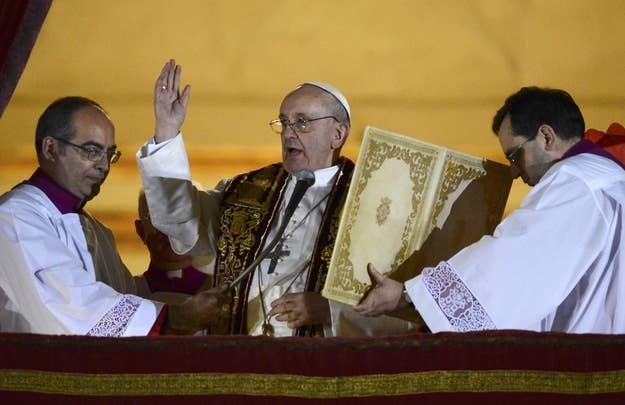
Shortly after Pope Benedict XVI announced his retirement, the gay rights activist who was the first to legally marry his partner in Latin America sent out a jubilant tweet. Argentina's Cardinal Jorge Bergoglio "cannot be pope," wrote Alex Freyre, because "he lost his papabile status the instant I married @josedibellow. Same for any other Argentine priest."
On Wednesday, Freyre was proven wrong. When the cardinals elected Bergoglio pope, they made history in two ways: They chose the first Latin-American pope, but they also chose the first pope from a country where same-sex marriage became legal on his watch.
Although his focus has often been on social justice issues, Bergoglio is a strong defender of the church's position on the marriage issue. His militancy in the campaign against Argentina's "Equal Marriage Law" in 2010 was so tone-deaf that many observers credit him with helping the law pass. But the mistakes his church made in combatting the law — and the tack it has taken since — may suggest the new Pope Francis will be savvier about guiding the church in opposing marriage in countries headed in that direction.
Bergoglio was Argentina's top bishop during the fight over the marriage law. One of the major turning points in the debate came when a letter he'd written to a group of nuns explaining opposition to the law was made public. The rhetoric seemed so out of touch with Argentina's largely secular population that it marginalized the church even further in the debate.
The law was "sent by the Devil," Bergoglio wrote in July 2010:
Let's not be naive: This is not a simple political fight; it is a destructive proposal to God's plan. This is not a mere legislative proposal (that's just it's form), but a move by the father of lies that seeks to confuse and deceive the children of God… Let's look to St. Joseph, Mary, and the Child to ask fervently that they defend the Argentine family in this moment… May they support, defend, and accompany us in this war of God.
To this day, the embarrassment the letter caused is evident.
"Bergoglio's letter is nonexistent. It was a private letter" said Father Alberto Bochatey, head of the Catholic University of Argentina's Marriage and Family Institute, when this reporter met with him in Buenos Aires last fall. But, he said, "It surely had a cost."
Around the same time as Bergoglio's letter reached the press, groups of priests from the cities of Quilmes and Córdoba publically denounced the church's position; one priest, Nicolas Alesio, wound up being defrocked for endorsing the marriage law.
When it became clear that stopping the marriage law would be impossible, the church may have tacitly given its backing to a civil union law as a way to head off the marriage bill. Senator Liliana Negre de Alonso, a member of Opus Dei and one of the politicians most closely linked to the Catholic Church, sponsored the civil union bill. (This would be like Rick Santorum having endorsed a civil union law in the United States.) It went nowhere. During the debate, the leader of the majority party reduced her to tears while calling her a "Nazi" for backing legislation that would create a "separate-but-equal" status for same-sex couples.
After that, the church noticeably moderated its tone when fighting social issues. During a debate over changes to the civil code in 2012, which included sensitive reproduction issues like surrogacy and the handling of fertilized eggs, the church tread far more lightly — making their case but avoiding the strong language that cost them support in 2010.
"Today they come with a stance that is much more receptive to another point of view," said the chairman of the committee leading the civil code reforms back in August 2012.
How much this experience has moderated Bergoglio himself remains to be seen. He was replaced as the leader of the Argentine church by Archbishop José María Arancedo, who is known for having a far less belligerent manner than Bergoglio. (He also tries to avoid the controversial issue. When this reporter met him for a scheduled audience to talk about the marriage law this fall, he fled his office when he understood what was to be discussed.)
But Bergoglio understands far better than his predecessor the challenges of opposing the tide in favor of same-sex marriage in countries where the church is embattled on many fronts. Even though 76% of Argentines identify as Roman Catholic, just 38.2% of Argentines went at least once a month in 2005, the most recent data available from the Association of Religious Data Archives.
If the position of the church itself does not change, Bergoglio — now Pope Francis — may nonetheless have a more grounded sense of how to lead an institution in countries where its policy positions are dividing it from the people it hopes to reach.
J. Lester Feder is a BuzzFeed contributor and a 2013 Alicia Patterson Fellow.
